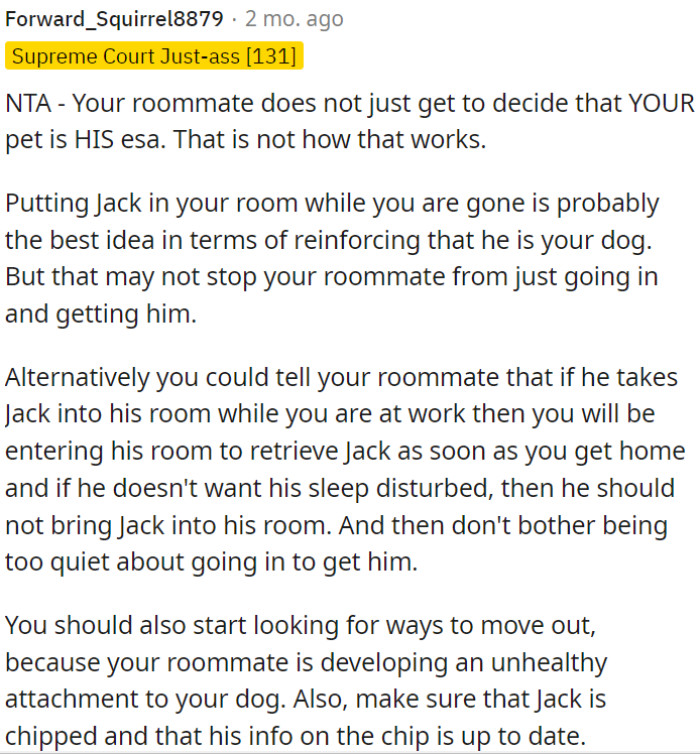Man Forced To Hide His Dog From Roommate Who Declared It His Emotional Support Animal
In an unusual living arrangement, a conflict has arisen over a miniature poodle named Jack, who has unwittingly become the center of attention for two roommates with differing views. The scenario involves a 25-year-old dog owner and his 14-year-old poodle named Jack, who holds a special place in his heart.
Meanwhile, his 23-year-old roommate believes Jack could serve as an emotional support animal (ESA), helping him cope with his struggles. The roommate's eagerness to have Jack as his ESA stems from his conviction that the poodle uniquely understands his emotional turmoil.
He has gone to great lengths to coax the poodle into his room whenever the owner's attention wavers, often creating awkward standoffs. The issue becomes particularly thorny when the owner embarks on his night shift job, leaving Jack in the hands of his enthusiastic roommate.
The crux of the problem arises from the roommate's decision to delay his bedtime until after the owner leaves for work, ensuring Jack accompanies him. This well-intentioned gesture spirals into a sleep schedule predicament for the owner, who grapples with sleep deprivation due to his busy daytime schedule of work and studies.
Losing an hour or two of sleep upon returning home proves detrimental to his well-being. Faced with this dilemma, the owner contemplates confining Jack to his room before departing for work, potentially alleviating the sleep schedule disruption.
However, ethical concerns over the roommate's desire for Jack as an ESA cast a shadow of doubt over the solution.
OP's roommate believes that OP's dog is an ideal emotional support animal for him. Therefore, he inquired if OP would be willing to let him have the dog.

The concern lies not in the dog being with OP's roommate while he is at work, but rather in having to wait for 1 to 2 hours after getting home for the roommate to wake up.

OP's roommate can't arbitrarily claim OP's pet as his ESA.

The Role of Emotional Support Animals
Dr. Anne Roberts, a licensed psychologist, explains that emotional support animals (ESAs) can provide significant psychological benefits for individuals with mental health challenges.
Research shows that having an ESA can reduce symptoms of anxiety and depression, offering companionship and stability in times of emotional distress.
However, the designation of an animal as an ESA comes with responsibilities that can complicate living arrangements with others.
The Significance of Emotional Support Animals
This situation sheds light on the growing recognition of emotional support animals (ESAs) in our society. Research from the Human Animal Bond Research Institute indicates that ESAs can significantly alleviate symptoms of anxiety and depression, offering emotional stability and comfort during stressful times. This Redditor’s predicament illustrates the complexities that arise when multiple individuals claim emotional attachments to a single animal.
The psychological benefits of having an ESA are well-documented, with studies showing that interactions with animals can boost oxytocin levels, promoting feelings of happiness and reducing stress.
Roommate can get his own dog with a prescription.

OP should place the dog in his room, add a lock to the door, and not allow the roommate to enter in his absence.

A few weeks of early mornings might solve it.

From a psychological standpoint, the bond between humans and animals can enhance feelings of safety and security.
Studies indicate that interactions with pets can lower cortisol levels and increase oxytocin, fostering a sense of well-being.
It's crucial to recognize the emotional significance these animals hold for their owners, as misunderstandings can lead to conflicts, especially in shared living spaces.
However, the conflict here highlights the boundaries of emotional support and ownership. A clinical psychologist points out that when multiple people assert claims over an animal, it can lead to confusion and conflict regarding the emotional needs that each individual has. This situation may also reflect deeper issues of dependency and attachment styles, particularly if one person feels threatened by another's relationship with the animal.
According to research published in the Journal of Social and Personal Relationships, attachment styles can influence how individuals navigate interpersonal relationships, particularly in situations involving shared emotional resources.
Roommate needs his own dog.

If OP's roommate needs an emotional support animal, he should take care of one himself instead of just benefiting from OP.

Considering the roommate's odd behavior, OP needs to contemplate changing roommates to prevent any potential dog theft.

Navigating Conflicts Over ESAs
Dr. Lisa Morgan, a conflict resolution expert, suggests that open communication is vital when navigating disputes over emotional support animals.
When roommates have differing views on the role of an ESA, tensions can escalate, causing stress for both parties.
Research shows that employing conflict resolution strategies can help de-escalate situations and promote mutual understanding.
Navigating Shared Emotional Spaces
This scenario also emphasizes the importance of setting clear boundaries in shared living situations. A behavior analyst suggests that open communication about the roles and responsibilities associated with the emotional support animal can help mitigate potential conflicts. Establishing agreements regarding care, access, and emotional needs can create a more harmonious living environment.
Research supports the idea that effective communication can alleviate tension and misunderstandings, leading to improved relational dynamics among housemates.
Jack is OP's dog.

OP needs to consider parting ways with the roommate as the situation could deteriorate.

OP needs to set boundaries - his dog, his rules.

For individuals facing conflicts around ESAs, setting clear boundaries and discussing each person's needs can lead to more harmonious living arrangements.
Engaging in mediation with a neutral party may also help clarify expectations and reduce misunderstandings.
Being open to compromise can help find solutions that respect both the emotional needs of the ESA owner and the comfort of their roommates.
Moreover, the psychological concept of co-dependency may be at play in this situation. A clinical psychologist emphasizes that when individuals become overly reliant on their emotional support animals for stability, it can create imbalances in their interpersonal relationships. This dependency can lead to tensions when multiple individuals claim ownership or emotional rights over the animal.
Understanding these dynamics can help individuals recognize the importance of building emotional resilience beyond reliance on animals, fostering healthier coping strategies.
One roommate wants Jack to be their special pet for emotional support. However, the other roommate loves Jack a lot and takes care of him, so they have an important connection.
This situation shows us that it's important to talk and understand each other's feelings. They could consider other ways to solve the problem, such as the roommate getting their own pet, or a solution for OP could be finding a new place to live.
Practical Recommendations for Co-habitation
To resolve the tensions surrounding the emotional support animal, individuals can adopt practical approaches aimed at fostering cooperation. Establishing a shared agreement on the animal's care and access can help clarify expectations and reduce misunderstandings. Regular discussions about each person's emotional needs and how the animal can support them can promote a collaborative approach.
Engaging in joint activities with the animal can also strengthen bonds among housemates, fostering a sense of unity and shared responsibility.
Psychological Analysis
This scenario reflects the intricate dynamics of emotional dependency and cohabitation. Recognizing the importance of clear communication and boundaries can facilitate healthier interactions among individuals sharing emotional support animals.
Analysis generated by AI
Analysis & Alternative Approaches
In conclusion, navigating the complexities of shared emotional support animals requires effective communication and boundary-setting. By fostering an environment of collaboration and understanding, individuals can enhance their emotional well-being while minimizing conflict. Research supports the notion that cooperation and open dialogue lead to healthier relational dynamics in shared living situations.
Understanding Legal Protections for ESAs
Legal considerations surrounding emotional support animals can be complex, and understanding these laws is crucial for both owners and roommates.
Dr. Michelle Reed, a legal psychologist, points out that the Fair Housing Act provides certain protections for ESA owners, but these rights can vary by location.
Research indicates that being informed about these laws can help prevent conflicts and ensure that everyone’s rights are respected.
Psychological Analysis
This situation underscores the complexities surrounding emotional support animals and the dynamics they create in shared living spaces. It's vital for both owners and roommates to engage in open dialogue about their needs and expectations. Understanding the emotional significance of ESAs for their owners can foster empathy and facilitate conflict resolution.
Analysis generated by AI
Analysis & Alternative Approaches
Understanding the dynamics surrounding emotional support animals and their owners is essential for fostering healthy living environments.
As research indicates, effective communication and knowledge of legal rights can mitigate conflicts and enhance relationships between roommates.
Creating a mutual understanding of needs and boundaries is key to navigating these complex situations successfully.



